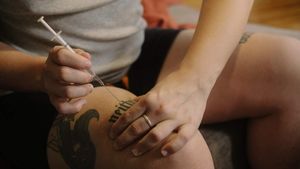Many women, especially lesbian couples, choose to undergo the process of in vitro fertilization (IVF) with the hopes of conceiving a happy, healthy baby boy or girl. IVF has been a huge contributor to lesbian couples getting pregnant for some time now since the "traditional" method of conceiving is generally out of the question in most cases. A new study has just been released that suggests that babies conceived via IVF have a possible four percent chance of being born with a birth defect (such as heart and urogenital tract malformations).
The study included information collected from 15,162 births among 33 French fertility clinics. Major and minor birth defect occurrences were utilized in this process. Information for the study was collected when pediatricians and parents of the newborns filled out surveys pertaining to the health of their child(ren). This information was then compared to data from national registers and other studies previously concluded.
According to the study: Children in the study were born via IVF, a process in which egg and sperm are fertilized in a petri dish and then implanted in the woman's uterus, and/or intracytoplasmic sperm injection (ICSI), which involves injecting a single sperm into an egg. IVF can also be performed with ICSI.
"Fertility doctors must be informed about the increased risks of imprinting disorders and major malformations because if couples raise questions specifically on this topic, they have to answer as precisely as possible," Geraldine B. Viot, MD, a clinical geneticist at the Maternité Port Royal Hospital, Paris, France, said in an email to WebMD. Imprinting disorders occur because of a mutation in a gene inherited from either the mother or the father. I'm not sure that women and men undergoing [fertility treatment] should be informed systematically about these risks, as couples having children naturally ignore the risk of major malformations," she says.
More on next page...
\\\
(continued)
The study also resulted in the knowledge that women of a "certain age" are not at a higher risk for conceiving a child with birth defects. Low birth weights contributed to major malformations, however. Premature births were not at a higher risk for birth defects.
Lesbians now have more choices than ever to conceive thanks to ongoing studies in fertility treatments, including IVF. In fact, science has become advanced enough to support partner-to-partner egg donation. This type of procedure is becoming more and more common, but it can be expensive. Still, for partners wishing to have a little bit of both of them in their child's DNA, it is definitely possible.
In the state of Iowa, two women (Heather and Melissa Gartner) are currently fighting with the assistance of Lambda Legal to allow both of their names on a birth certificate. Iowa began allowing same-sex marriage after the Iowa Supreme Court upheld Varnum v. Brien on April 3, 2009, but the State Health Department refused to allow their request to have both names on the birth certificate of their child born by IVF last September. The case is currently in court.























































































 Cindy Ord/Getty Images
Cindy Ord/Getty Images























